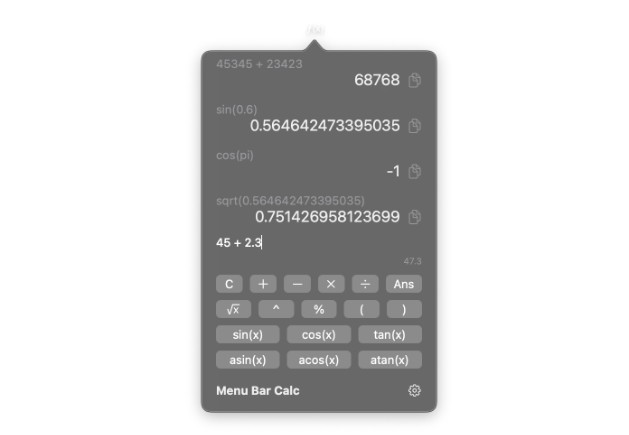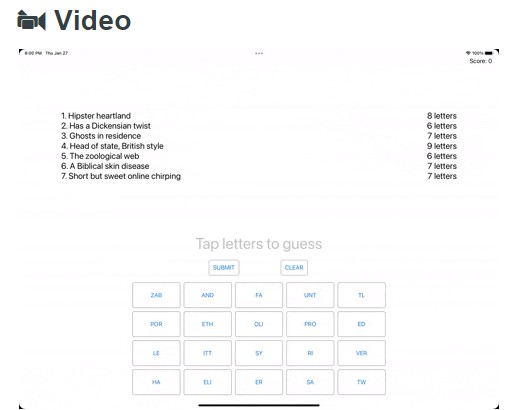Advanced-Swift
Course on Intermediate to Advanced swift techniques Udemy
Collections
iterating
let names = ["Alex", "John", "Mary"]
var nameIteratory = names.makeIterator()
while let name = nameIteratory.next() {
print(name)
}
/*
for name in names {
print(name)
}
*/
/*
----------------------------- Swift protocol
protocol IteratorProtocol {
associatedtype Element
mutating func next() -> Element?
}
*/
struct Countdown: Sequence {
let start: Int
func makeIterator() -> some IteratorProtocol {
return CountdownIterator(self)
}
}
struct CountdownIterator: IteratorProtocol {
let countdown: Countdown
var currentValue: Int = 0
init(_ countdown: Countdown) {
self.countdown = countdown
self.currentValue = countdown.start
}
// if mutating a value
mutating func next() -> Int? {
if currentValue > 0 {
let value = currentValue
currentValue -= 1
return value
} else {
return nil
}
}
}
let countdown = Countdown(start: 10)
for count in countdown {
print(count)
}
filter
var names = ["Alex", "John", "Steven", "Mary"]
let finalNames = names.filter { name in
return name.count > 4
}
struct Movie {
let title: String
let genre: String
}
var movies = [
Movie(title: "Lord of the Rings", genre: "Fiction"),
Movie(title: "ET", genre: "Fiction"),
Movie(title: "Finding Nemo", genre: "Kids"),
Movie(title: "Cars", genre: "Kids")
]
let movieToRemove = Movie(title: "Finding Nemo", genre: "Kids")
movies = movies.filter { movie in
return movie.title != movieToRemove.title
}
let kidsMovies = movies.filter { movie in
return movie.genre == "Kids"
}
forEach and enumerated
struct Movie {
let title: String
let genre: String
}
var movies = [
Movie(title: "Lord of the Rings", genre: "Fiction"),
Movie(title: "ET", genre: "Fiction"),
Movie(title: "Finding Nemo", genre: "Kids"),
Movie(title: "Cars", genre: "Kids")
]
movies.forEach { movie in
addToFav(movie)
}
func addToFav(_ movie: Movie) { }
// Get Access to Index with enumerated
// ---------------------------returns a Tuple (a, b)
movies.enumerated().forEach { (index, movie) in
print("Movie: index - \(index), title - \(movie.title)")
}
lazy iteration
when only needing access to small amounts of large amounts of data
let indexes = 1..<5000
let images = indexes.lazy.filter { index -> Bool in
print("[filter]")
// anything divisble by 2
return index % 2 == 0
}.map { index -> String in
print("[map]")
return "image_\(index)"
}
let lastThreeImages = images.suffix(3)
//lastThreeImages.forEach { image in
// print(image)
//}
lastThreeImages.forEach { print($0) }
reduce
will reduce array to 1 value
struct Item {
let name: String
let price: Double
}
struct Cart {
// can only be set from with Cart struct
private(set) var items: [Item] = []
mutating func addItem(_ item: Item) {
items.append(item)
}
// reduce - will reduce array to 1 value
var total: Double {
//---------- 0 init value -------- Result type
items.reduce(0) { (value, item) -> Double in
return value + item.price
}
}
}
var cart = Cart()
cart.addItem(Item(name: "Milk", price: 4.50))
cart.addItem(Item(name: "Bread", price: 2.50))
cart.addItem(Item(name: "Eggs", price: 12.00))
print(cart.total)
let items = [2.0,4.0,5.0,7.0]
let totalItems = items.reduce(0, +)
print(totalItems)
reduce(into: )
let ratings = [4, 8.5, 9.5, 2, 6, 3, 5.5, 7, 2.8, 9.8, 5.9, 1.5]
// -------------------------------------------------inout - results must/can be modified inside closure
let results = ratings.reduce(into: [:]) { (results: inout [String: Int], rating: Double) in
switch rating {
case 1..<4: results["Very Bad", default: 0] += 1
case 4..<6: results["Ok", default: 0] += 1
case 6..<8: results["Good", default: 0] += 1
case 8..<11: results["Excellent", default: 0] += 1
default: break
}
// returns the modified results object
}
print(results)
zip
let students = ["Alex", "Mary", "John", "Steven"]
let grades = [3.4, 2.8, 3.8, 4]
// will only return a pair that as an equal index in both sequences
let pair = zip(students, grades)
pair.forEach { studentAndGrade in
print(studentAndGrade.0) // 0 index = students
print(studentAndGrade.1) // 1 index = grades
}
Functions
inout
in-out parameters
struct User {
var userID: Int?
let name: String
}
func saveUser(_ user: inout User) {
// code to save user
user.userID = 100
}
var user = User(name: "John Doe")
saveUser(&user) // & = copy of type
nested
functions inside another function
struct Pizza {
let sauce: String
let toppings: [String]
let crust: String
}
class PizzaBuilder {
func prepare() -> Pizza {
func prepareSauce() -> String {
return "Tomato Sauce"
}
func prepareToppings() -> [String] {
return ["Chicken", "Pesto", "Mushroom"]
}
func prepareCrust() -> String {
return "Hand tossed"
}
let sauce = prepareSauce()
let toppings = prepareToppings()
let crust = prepareCrust()
return Pizza(sauce: sauce, toppings: toppings, crust: crust)
}
}
let pizzaBuilder = PizzaBuilder()
let pizza = pizzaBuilder.prepare()
closures
functions as variables, passing functions to functions
/*
var hello = {
print("Hello")
}
hello()
*/
/*
var hello: (String) -> () = { name in
print("Hello \(name)")
}
hello("John")
*/
// If passed more than one parameter use $1, $2 etc
var hello: (String) -> () = { print("Hello \($0)") }
hello("John") // Hello John
var helloOnly: (String) -> () = { _ in
print("Hello") }
helloOnly("John") // Hello
// ----- number - times
let power: (Int, Int) -> Int = { number, times in
number * times
}
let result = power(5, 3)
print(result)
let pow: (Int, Int) -> Int = { $0 * $1 }
let powResult = pow(5, 3)
print(powResult)
pass closure into a function – @escaping closures
func getPosts(complete: @escaping ([String]) -> ()) {
var posts: [String] = []
DispatchQueue.main.asyncAfter(deadline: .now() + 2) {
posts = ["Hello World", "Introduction to Closures"]
complete(posts)
}
}
getPosts { posts in
print(posts)
}
Enums
replacing structs with enums
enum Session {
case keynote(title: String, speaker: String, date: Date, isRecorded: Bool)
case normal(title: String, speaker: String, date: Date)
case workshop(title: String, speaker: String, date: Date, isRecorded: Bool)
case joint(title: String, speakers: [String], date: Date)
}
let keynote = Session.keynote(title: "WWDC 2022", speaker: "Tim Cook", date: Date(), isRecorded: true)
func displaySession(session: Session) {
switch session {
case let .keynote(title: title, speaker: speaker, date: date, isRecorded: isRecorded):
print("\(title) - \(speaker) - \(date) - \(isRecorded)")
case let .normal(title: title, speaker: speaker, date: date):
print("\(title) - \(speaker) - \(date)")
case let .workshop(title: title, speaker: speaker, date: date, isRecorded: isRecorded):
print("\(title) - \(speaker) - \(date) - \(isRecorded)")
case let .joint(title: title, speakers: speakers, date: date):
print("\(title) - \(speakers) - \(date)")
}
}
hiding types
struct Teacher {
let name: String
let courses: [String]
}
struct Student {
let name: String
let courses: [String]
var grade: String?
}
let teacher = Teacher(name: "John Doe", courses: ["Math", "Science"])
let student = Student(name: "John Doe", courses: ["Math", "Science"])
enum User {
case teacher(Teacher)
case student(Student)
}
let allUsers = [User.teacher(teacher), User.student(student)]
for user in allUsers {
switch user {
case .teacher(let teacher):
print(teacher.courses)
case .student(let student):
print(student.grade ?? "")
}
}
subclassing with enums
enum Ticket {
case economy(Economy)
case firstClass(FirstClass)
case bussiness(Business)
case international(International)
}
struct Economy {
let departure: String
let arrival: String
}
struct FirstClass {
let departure: String
let arrival: String
let meal: Bool
}
struct Business {
let departure: String
let arrival: String
let meal: Bool
let chargingPorts: Bool
}
struct International {
let departure: String
let arrival: String
let meal: Bool
let chargingPorts: Bool
let baggageAllowed: Bool
}
let ticket = Ticket.bussiness(Business(departure: "Houston", arrival: "Denver", meal: true, chargingPorts: true))
func checkIn(ticket: Ticket) {
switch ticket {
case .economy(let economy):
print("\(economy)")
case .firstClass(let firstClass):
print("\(firstClass)")
case .bussiness(let bussiness):
print("\(bussiness)")
case .international(let international):
print("\(international)")
}
}
sub classing 2
struct Student {
let name: String
let courses: [String]
let isFullTime: Bool
}
struct Teacher {
let name: String
let courses: [String]
let isFullTime: Bool
}
struct Staff {
let name: String
let isFullTime: Bool
}
enum User {
case student(Student)
case teacher(Teacher)
case staff(Staff)
}
func updateProfile(user: User) {
switch user {
case .student(let student):
print(student)
case .teacher(let teacher):
print(teacher)
case .staff(let staff):
print(staff)
}
}
updateProfile(user: User.student(Student(name: "John Doe", courses: ["Math", "Science"], isFullTime: true)))
raw values
scenerio 1
enum NetworkError: Error {
case badURL
case decodingError
}
//enum TemperatureUnit: String {
// case imperial = "fahrenheit"
// case metric = "celsius"
//}
// Variables updated by third party - scenerio
enum TemperatureUnit: String {
case imperial = "F"
case metric = "C"
}
private func getWeatherURL(unit: TemperatureUnit) -> URL? {
switch unit {
case .imperial:
return URL(string: "www.weather.com/?unit=fahrenheit")
case .metric:
return URL(string: "www.weather.com/?unit=celsius")
}
}
func getWeather(unit: TemperatureUnit) throws {
guard let url = getWeatherURL(unit: unit) else {
throw NetworkError.badURL
}
print(url)
// code to call weather api
}
/*
func getWeather(unit: TemperatureUnit) throws {
guard let url = URL(string: "www.weather.com/?unit=\(unit.rawValue)") else {
throw NetworkError.badURL
}
print(url)
// code to call weather api
}
*/
do {
try getWeather(unit: .imperial)
} catch {
print(error)
}
scenerio 2
enum ImageType: String {
case jpg
case bmp
case png
init?(rawValue: String) {
switch rawValue.lowercased() {
case "jpg", "jpeg": self = .jpg
case "bmp", "bitmap": self = .bmp
case "png": self = .png
default: return nil
}
}
}
func iconName(for fileExtension: String) -> String {
guard let imageType = ImageType(rawValue: fileExtension) else { return "assetUnknown" }
switch imageType {
case .jpg:
return "assetJPG"
case .bmp:
return "assetBMP"
case .png:
return "assetPNG"
}
}
iconName(for: "jpg")
iconName(for: "jpeg")
Properties
lazy stored properties
will only be initalized once / and accessible immediately after first init (ideal for api call)
enum Level {
case easy
case medium
case hard
}
struct Exam {
var level: Level
// lazy = will fetch quetions the 2nd time instantly without api call
// private(set) = can only set within Exam structure not later
lazy private(set) var questions: [String] = {
// mock - api fetch time span
sleep(5)
switch level {
case .easy:
return ["What is 1+2", "What is 1+2", "What is 2+2"]
case .medium:
return ["What is 11+22", "What is 11+22", "What is 32+42"]
case .hard:
return ["What is 122+332", "What is 441+255", "What is 266+250"]
}
}()
}
var exam = Exam(level: .easy) // must be mutable - var
print(exam.questions)
print("Wait for 1 second")
sleep(1)
print(exam.questions) // returned instantly
// exam.questions = ["What is the capital of US?"] = NOT Allowed with private(set) property wrapper
computed properties
struct Workout {
let startTime: Date
let endTime: Date
var timeElapsed: TimeInterval {
endTime.timeIntervalSince(startTime)
}
}
let start = Date()
sleep(5)
let end = Date()
let workout = Workout(startTime: start, endTime: end)
//print(workout.endTime.timeIntervalSince(workout.startTime))
print(workout.timeElapsed)
struct CartItem {
let name: String
let price: Double
}
struct Cart {
let items: [CartItem]
var total: Double {
items.reduce(0) {
return $0 + $1.price
}
}
}
let items = [
CartItem(name: "Bread", price: 4.50),
CartItem(name: "Milk", price: 3.50),
CartItem(name: "Pizza", price: 10.95)
]
let cart = Cart(items: items)
print(cart.total)
property observers
struct Website {
init(url: String) {
// defer = will get called when init exits - will run didSet when executed
defer { self.url = url }
self.url = url
}
var url: String {
willSet {
// fired before new value is give to property
// newValue - to get new value of property
}
// didSet is not called when creating an instance
didSet {
url = url.addingPercentEncoding(withAllowedCharacters: .urlHostAllowed) ?? url
}
}
}
var website = Website(url: "www.movies.com/?search=Lord of the Rings")
print(website) // Website(url: "www.movies.com%2F%3Fsearch=Lord%20of%20the%20Rings")
Initializers
in structs
struct Student {
let firstname: String
let lastname: String
let grade: String
}
extension Student {
// will allow you to keep the default initializer
init(firstname: String, lastname: String) {
self.firstname = firstname
self.lastname = lastname
self.grade = ""
}
}
let student = Student(firstname: "", lastname: "")
let otherStudent = Student(firstname: "", lastname: "", grade: "")
convience initializers
class Car {
var make: String
var model: String
var color: String
init(make:String, model: String, color: String) {
self.make = make
self.model = model
self.color = color
}
convenience init(make: String, model: String) {
self.init(make: make, model: model, color: "White")
}
}
let car = Car(make: "Honda", model: "Accord")
subclassing
class Tesla: Car {
var range: Double
init(make: String, model: String, color: String, range: Double) {
self.range = range
super.init(make: make, model: model, color: color)
}
override init(make: String, model: String, color: String) {
self.range = 300
super.init(make: make, model: model, color: color)
}
}
let tesla = Tesla(make: "", model: "", color: "", range: 0)
required initializers
protocol CarType {
init(make: String, model: String)
}
//MARK: - always mark as Final until you know if inheriting
final class Car: CarType {
var make: String
var model: String
var color: String
init(make:String, model: String, color: String) {
self.make = make
self.model = model
self.color = color
}
required convenience init(make: String, model: String) {
self.init(make: make, model: model, color: "White")
}
/*
class func makeCar(make: String, model: String) -> Self {
let car = self.init(make: make, model: model)
// setup engine
// setup fuel
// setup tires
return car
}
*/
}
let car = Car(make: "Honda", model: "Accord")




